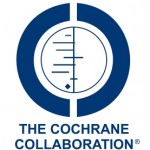
Earlier this week (11th Sept ) we reported on a trial that compared the use of two different irrigant solutions during root canal treatment (RoCT). Now a review that aims to assess the effects of irrigants used in the non-surgical of mature permanent teeth has been published on the Cochrane Library.
The usual sound Cochrane methodological approach was taken with detailed searches of Cochrane Oral Health Group’s Trials Register, the Cochrane Central Register of Controlled Trials (CENTRAL), Medline, Embase and LILACS, with no restrictions regarding language or date of publication. Randomised controlled trials in permanent teeth requiring RoCT were included. Interventions included any irrigants either against each other or against inactive agent (irrigant) or placebo.
- Eleven trials (851 participants, 879 teeth) were included, two trials were at low risk of bias, six unclear and three high risk.
- Four trials compared sodium hypochlorite versus chlorhexidine, however only one secondary outcome, bacterial growth cultures, was reported for two of these trials. meta-analysis indicated no strong evidence of a difference in the existence of bacterial growth between the interventions (risk ratio 0.73; 95% confidence interval 0.34 to 1.56; P = 0.41).
- The seven remaining trials each compared different interventions and only two of these trials included useable data on the primary outcomes of swelling and pain.
The authors concluded
Although root canal irrigants such as sodium hypochlorite and chlorhexidine appear to be effective at reducing bacterial cultures when compared to saline, most of the studies included in this review failed to adequately report these clinically important and potentially patient-relevant outcomes. There is currently insufficient reliable evidence showing the superiority of any one individual irrigant. The strength and reliability of the supporting evidence was variable and clinicians should be aware that changes in bacterial counts or pain in the early postoperative period may not be accurate indicators of long-term success. Future trials should report both clinician-relevant and patient-preferred outcomes at clearly defined perioperative, as well as long-term, time points.
Links
Fedorowicz Z, Nasser M, Sequeira-Byron P, de Souza RF, Carter B, Heft M. Irrigants for non-surgical root canal treatment in mature permanent teeth. Cochrane Database of Systematic Reviews 2012, Issue 9. Art. No.: CD008948. DOI: 10.1002/14651858.CD008948.pub2.

[…] Dental Elf 13th Sept 2012 […]